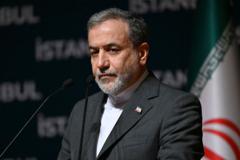In a stark contrast to earlier claims, the confirmation raises concerns over Iran's nuclear program's future and its diplomatic stance.
### Iranian Foreign Minister Confirms Severe Damage to Nuclear Sites

### Iranian Foreign Minister Confirms Severe Damage to Nuclear Sites
Acknowledging the aftermath of recent US-israeli bombardment, Iran's foreign minister revealed substantial harm inflicted on its nuclear facilities.
Iran's foreign minister, Abbas Araghchi, admitted on Thursday that "excessive and serious" damage resulted from recent US and Israeli bombings of nuclear sites in Iran. His remarks were made during an interview with a state broadcaster, coinciding with assessments by Iran's Atomic Energy Organisation. Earlier in the day, however, Supreme Leader Ayatollah Ali Khamenei had downplayed the strikes, claiming they did not significantly disrupt the nuclear programme. Khamenei countered US President Donald Trump's statements, asserting that the attacks failed to achieve meaningful results and labeled the US claims about the bombings as exaggerations.
The foreign minister’s candid admission presents a stark contrast to the supreme leader's rhetoric. Araghchi stated that there are currently no plans to restart nuclear negotiations with the US, particularly after negotiations were halted when Israel commenced its bombing campaign. He emphasized there have been no agreements or discussions about reopening talks, adding that the government is reassessing what will be beneficial for the Iranian populace, hinting at a potential shift in diplomatic strategy without elaborating on specifics.
The Trump administration had previously floated the idea of facilitating Iran's access to $30 billion for civilian nuclear energy development, along with lifting some sanctions and freeing restricted Iranian funds, as a means to re-engage Iran in negotiations. However, the ongoing situation appears to complicate those efforts.
Meanwhile, Iranian lawmakers recently approved legislation that, if enacted, would halt cooperation with the International Atomic Energy Agency (IAEA), meaning Iran would be less willing to allow nuclear inspections. The Israeli government has justified its aggressive actions by alleging they are necessary to prevent Iran from pursuing nuclear weapons, a claim consistently denied by Tehran, which maintains that its nuclear program is purely for peaceful purposes.
The US directly entered the conflict over the weekend, targeting Iranian facilities in Fordo, Natanz, and Isfahan. US Defense Secretary Pete Hegseth stated that intelligence assessments indicated the assaults potentially setbacks Iran’s nuclear developments by several years. In contrast, a leaked Pentagon report suggested the damage was less substantial, claiming only a few months delay in Iran's nuclear initiatives, a conclusion the administration rejected.
The escalations have resulted in significant casualties, with Iranian health officials reporting 610 fatalities amidst the Israeli air strikes, while Israeli sources noted 28 deaths in their country. As Tehran navigates through this tumultuous environment, its citizens face a challenging reality amid rising tensions.
The foreign minister’s candid admission presents a stark contrast to the supreme leader's rhetoric. Araghchi stated that there are currently no plans to restart nuclear negotiations with the US, particularly after negotiations were halted when Israel commenced its bombing campaign. He emphasized there have been no agreements or discussions about reopening talks, adding that the government is reassessing what will be beneficial for the Iranian populace, hinting at a potential shift in diplomatic strategy without elaborating on specifics.
The Trump administration had previously floated the idea of facilitating Iran's access to $30 billion for civilian nuclear energy development, along with lifting some sanctions and freeing restricted Iranian funds, as a means to re-engage Iran in negotiations. However, the ongoing situation appears to complicate those efforts.
Meanwhile, Iranian lawmakers recently approved legislation that, if enacted, would halt cooperation with the International Atomic Energy Agency (IAEA), meaning Iran would be less willing to allow nuclear inspections. The Israeli government has justified its aggressive actions by alleging they are necessary to prevent Iran from pursuing nuclear weapons, a claim consistently denied by Tehran, which maintains that its nuclear program is purely for peaceful purposes.
The US directly entered the conflict over the weekend, targeting Iranian facilities in Fordo, Natanz, and Isfahan. US Defense Secretary Pete Hegseth stated that intelligence assessments indicated the assaults potentially setbacks Iran’s nuclear developments by several years. In contrast, a leaked Pentagon report suggested the damage was less substantial, claiming only a few months delay in Iran's nuclear initiatives, a conclusion the administration rejected.
The escalations have resulted in significant casualties, with Iranian health officials reporting 610 fatalities amidst the Israeli air strikes, while Israeli sources noted 28 deaths in their country. As Tehran navigates through this tumultuous environment, its citizens face a challenging reality amid rising tensions.






















